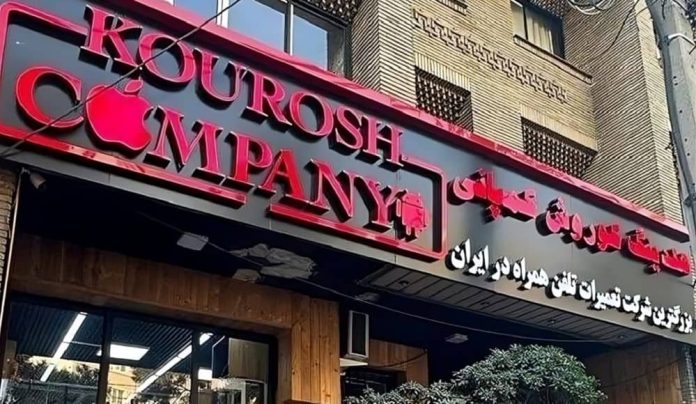Corruption and Embezzlement Surface in Iran as Kourosh Company’s iPhone Ponzi Scheme Collapses

iran tehran kourosh company sign
Three-minute read
Written by
Mansoureh Galestan
In a shocking revelation, Kourosh Pardazan EyeSaa (trading as Kourosh Company), a large mobile phone trading company, has been embroiled in a massive fraud scandal. The scandal, which came to light in February 2024, exposed the company’s deceitful practices in selling iPhones, resulting in the disappearance of its management and leaving numerous customers defrauded and empty-handed.
The controversy erupted when allegations surfaced regarding Kourosh Company’s fraudulent sale of iPhones, promising consumers the latest models at prices significantly lower than market rates. The company, which operated in the mobile phone commerce sector, claimed to offer iPhones, typically priced between 35 to 40 million Iranian rials, at a mere 20 million rials ($354 at the current market rates), by eliminating intermediaries from the supply chain.
The scheme relied heavily on extensive digital marketing campaigns and celebrity endorsements to attract many customers. Promising to deliver iPhone 13 models within 45 to 50 days, along with substantial discounts and special offers, Kourosh Company managed to lure in a considerable customer base.
However, after collecting payments from unsuspecting customers and conducting elaborate promotional activities, the company’s executives vanished, leaving behind a trail of angry customers and unanswered questions. Reports indicate that the company’s CEO and other top officials fled the country, with images suggesting their presence in either Turkey or Dubai.
Kourosh Company’s abrupt closure and the disappearance of its management have left customers in distress. The company once praised for its seemingly revolutionary approach to smartphone sales, is now shuttered, with its whereabouts unknown.
Record $3.7B Embezzlement Scandal Shakes #Iran’s Tea Industry, Revealing Deep #Corruption and Production Consequenceshttps://t.co/9FaxkCSvFj
— NCRI-FAC (@iran_policy) December 6, 2023
In the wake of the Kourosh Company scandal, revelations have surfaced regarding the complicity of Iranian state officials in enabling fraudulent activities and corrupt practices. Recent exposés from an Iranian dissident group and the breach of parliamentary servers have shed light on how members of the Parliament, including those affiliated with the Islamic Revolutionary Guard Corps (IRGC), have been involved in bribery and fraudulent schemes, contributing to an environment conducive to exploitation.
Moreover, the lack of oversight by the government in granting trade licenses has allowed fraudulent enterprises like Kourosh Company to operate unchecked. It has come to light that Amirhossein Sharifian, the primary figure behind Kourosh Company, was a draft dodger and lacked legal documentation to register a company under the regime’s laws. Despite this, his ties with the regime enabled him to use forged documents and win the trust of unsuspecting customers.
Further exacerbating the situation, Kourosh Company used state media channels to advertise its products and bolster its credibility among the public. The company’s audacious promises to import iPhones, despite Supreme Leader Ali Khamenei’s ban on the devices three years ago, underscore the brazen disregard for regulatory norms and practical immunity from the regime’s law enforcement.
Watch and judge why #embezzlement is breaking new records in #Iran pic.twitter.com/Zpzd4n1qLz
— NCRI-FAC (@iran_policy) December 6, 2023
Hundreds of cases of fraud and embezzlement in Iran have proven that the regime’s failure to address systemic corruption and regulate commercial activities has perpetuated a culture of impunity, encouraging unscrupulous actors to exploit vulnerable consumers.
In recent years, dozens of financial scandals in Iran, e.g., the cases of Cryptoland Exchange, Ramak Khodro, and the Tehran Stock Market crash, have robbed thousands of Iranians of their life savings. These incidents serve as stark reminders of the systemic corruption that plagues the country’s financial sector, where well-connected individuals exploit their ties to those in power to defraud the Iranian people. In each instance, promises of restitution and accountability have often fallen short, leaving countless investors disillusioned and financially devastated.
Multiple scams in the automotive and financial industries, characterized by non-deliveries and coercive demands for additional payments, were met by the Judiciary’s failure to respond to the defrauded customers, let alone any meaningful investigation.
These incidents collectively illustrate how the ruling establishment’s cozy ties with select businesses enable a culture of corruption and embezzlement that disproportionately impacts ordinary Iranians, pushing many into poverty. While state officials may believe they can enjoy lavish lifestyles at the expense of the people and suppress dissent by sheer fire superiority, each fraud case only serves to widen the base of discontent and fuel opposition to the regime.
Corruption and Embezzlement Surface in Iran as Kourosh Company’s iPhone Ponzi Scheme Collapses

